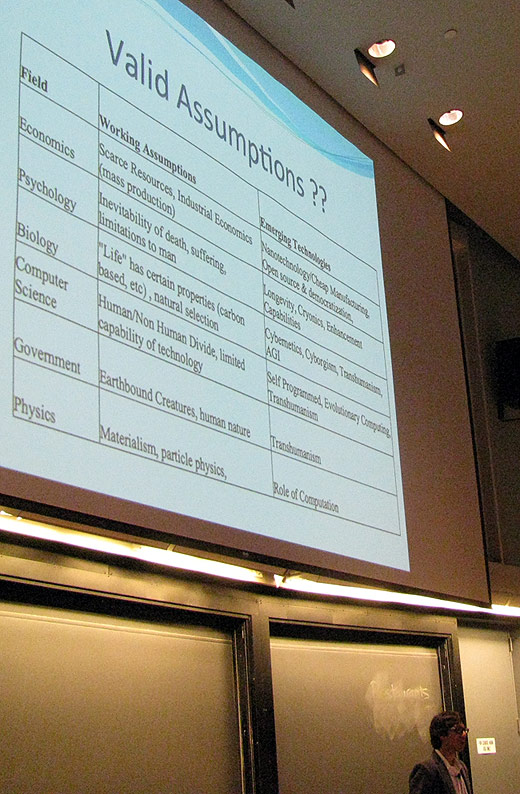
[Continuing coverage of the 2010 H+ Summit at Harvard.]
Kevin Jain (bio), an undergrad at Harvard who is president of the school’s Future Society, talks about “assumptions” behind academic disciplines. Each one is predicated on some assumed fact about human nature. Psychology assumes the existence of death; government assumes earthly bounds; economics assumes the existence of scarcity; computer science assumes a human/non-human divide.
Majoring in any of these disciplines will no longer be relevant, he says, as the assumptions on which they’re based change. Jain says he’s devising a new kind of textbook that takes account of the changes in these assumptions. That’s quite a project. He’s right to point out that much of our knowledge is based on the assumption of some shared nature between beings in society. Let’s even grant for the sake of argument that he’s right about those fundamental assumptions all being challenged. In that case, it certainly would be worth asking what would take their place. But it could not possibly be a matter of merely issuing new editions of our textbooks. If we lose the knowledge and wisdom we have accrued that is based on our shared experience and nature, what basis might there be for, say, communication, order, and society?
Here is Jain and a slide summarizing his thesis:


I would argue that the inevitability of death is unimportant to most of psychology – but that it has other important assumptions that would also be obliterated by a Vingean singularity. Psychology (and ethics) is probably the field that will change the most.
I'm not convinced that this situation, of each field having fundamental assumptions that will soon be proven wrong or no longer apply, is different than it was in the past. This has always been the case in the arts (think poetry, literature, painting, architecture), where the fundamental assumptions and objectives of one generation are destined to be laughed at by the next generation. Introducing the physics of computation as a new research area is not different from the introduction of other areas in the past. Nor will a Singularity likely bring any change to biology that is as significant as the theory of evolution was. Also, in some fields, such as economics and government, the fields have still not caught up with the implications of these limitations; so taking them away will not have so great an impact.